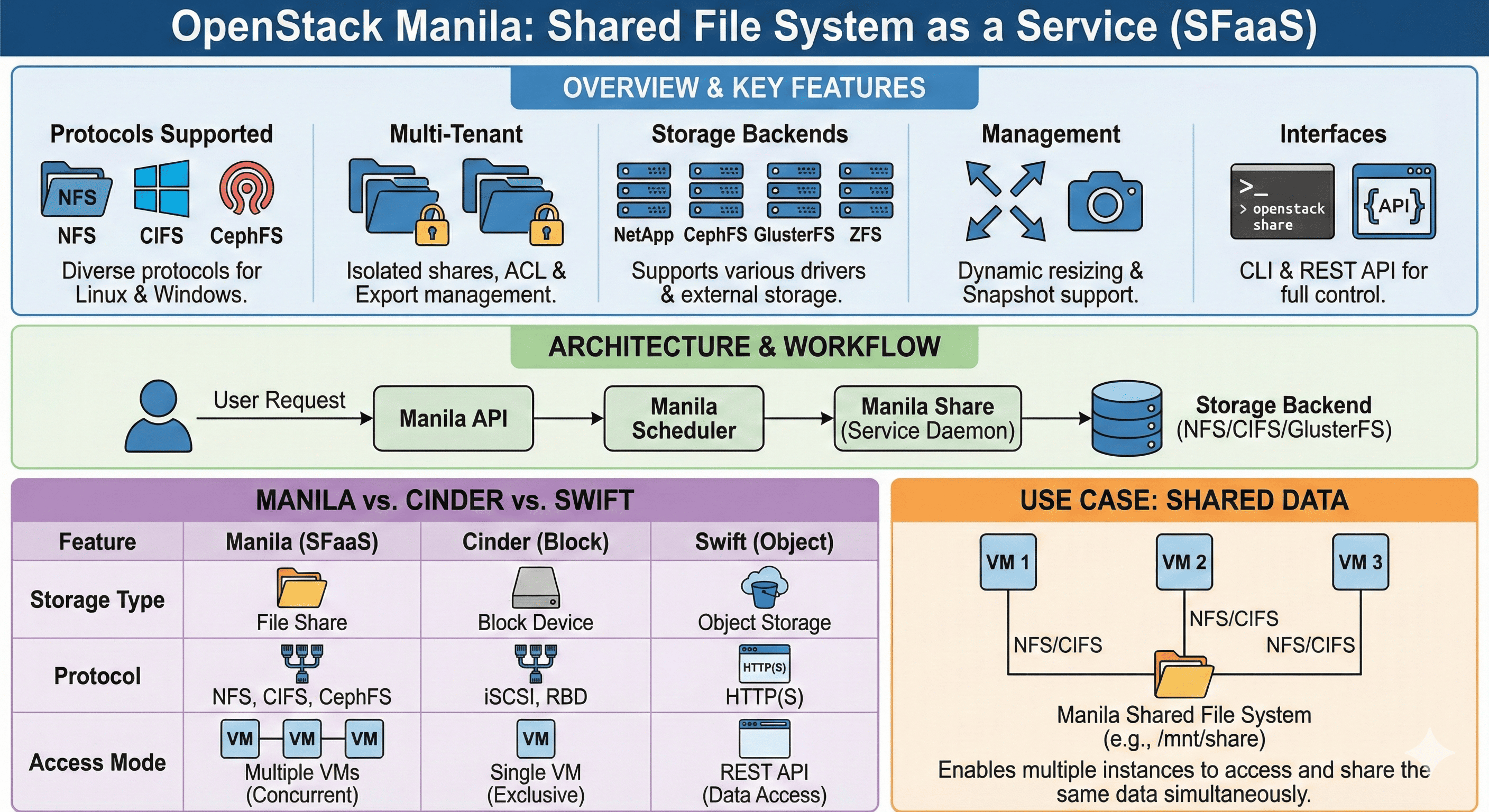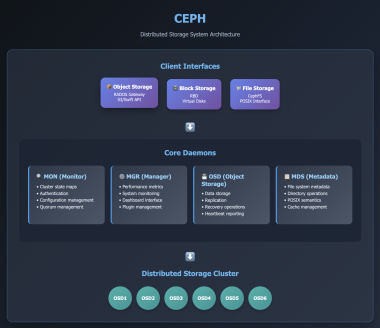16 min to read
Deep Dive into OpenStack Manila
Understanding OpenStack's Shared File System as a Service

Understanding OpenStack Manila
Manila is OpenStack’s Shared File System as a Service (SFaaS) that provides file sharing capabilities across multiple virtual machines and containers.
It supports various file sharing protocols like NFS and CIFS, enabling flexible and scalable file storage solutions in the cloud.
What is Manila?
The Shared File System Service
Manila serves as OpenStack’s file sharing service, providing essential functionality:
- File Sharing: Enables multiple VMs and containers to access shared storage simultaneously
- Protocol Support: Supports industry-standard protocols including NFS, CIFS/SMB, HDFS, and CephFS
- Multi-tenancy: Provides secure isolated file systems for different projects and users
- Storage Management: Manages complete file system lifecycle including creation, snapshots, and replication
- Enterprise Integration: Seamless integration with existing enterprise storage solutions
By providing shared file system capabilities, Manila enables efficient data sharing and collaboration in cloud environments while maintaining security and performance.
Why Use Manila?
Manila addresses critical challenges in cloud storage management:
- Shared Storage: Multiple instances can access the same data simultaneously
- Protocol Flexibility: Support for various file sharing protocols meets diverse application needs
- Scalability: Dynamic scaling of file systems based on demand
- Data Persistence: Persistent storage that survives instance lifecycle
- Enterprise Ready: Integration with enterprise storage arrays and NAS devices
- Cost Efficiency: Optimized resource utilization through shared access
Supported File System Types
Manila supports various file system types and protocols:
| Protocol/Type | Description | Use Cases |
|---|---|---|
| NFS | Network File System | Linux environments, container storage, shared application data |
| CIFS/SMB | Common Internet File System | Windows environments, mixed OS deployments, enterprise integration |
| CephFS | Ceph Distributed File System | High-performance computing, scalable storage, object storage |
| HDFS | Hadoop Distributed File System | Big data analytics, distributed computing, data lakes |
| GlusterFS | Scale-out Network File System | Distributed applications, high availability, scale-out storage |
Manila Architecture Overview (Diagram Description)
- Core Features: File Sharing, Multi-tenancy, Access Control
- Service Integration: Nova, Neutron, Keystone
- Storage: Backend Storage, Snapshots, Replication
- Protocols: NFS, CIFS, CephFS
Manila Architecture and Components
Manila’s architecture is designed to provide flexible and scalable file sharing capabilities.
Each component plays a specific role in managing and providing access to shared file systems.
Detailed Architecture
Manila follows a distributed architecture with clear separation of responsibilities:
Core Components
| Component | Role | Description |
|---|---|---|
| Manila API | API Service |
|
| Manila Scheduler | Resource Management |
|
| Manila Share | Share Service |
|
| Manila Data | Data Service |
|
Storage Backend Types
Manila supports multiple storage backend architectures:
| Backend Type | Description | Examples |
|---|---|---|
| Driver-only | Direct integration with storage arrays | NetApp, EMC, HPE 3PAR, Pure Storage |
| Generic Driver | Uses Nova instances as share servers | Generic NFS/CIFS servers, development environments |
| Container Driver | Container-based share servers | Docker-based NFS servers, lightweight deployments |
| Native Drivers | Purpose-built distributed file systems | CephFS, GlusterFS, HDFS |
Service Integration
Manila integrates seamlessly with several OpenStack services to provide comprehensive file sharing:
| Service | Integration Type | Benefits |
|---|---|---|
| Nova | Compute integration for share servers |
|
| Neutron | Network connectivity and isolation |
|
| Keystone | Identity and access management |
|
| Cinder | Block storage backend integration |
|
| Glance | Share server image management |
|
| Barbican | Encryption and key management |
|
This comprehensive integration enables robust file sharing within the complete OpenStack ecosystem.
Key Features and Capabilities
Manila provides comprehensive file sharing capabilities that enable efficient data sharing and collaboration.
These features make it a powerful tool for file system management in OpenStack environments.
Core Features
| Feature | Description | Benefits |
|---|---|---|
| Protocol Support | Multiple file sharing protocols |
|
| Storage Management | Flexible storage options |
|
| Access Control | Security features |
|
Best Practices
Key considerations for Manila deployment and operation:
| Category | Best Practice | Implementation |
|---|---|---|
| Protocol Selection | Choose appropriate file sharing protocol |
|
| Backend Selection | Select suitable storage backend |
|
| Network Design | Plan network architecture carefully |
|
| Access Control | Implement comprehensive security |
|
| Performance Tuning | Optimize for workload requirements |
|
| Monitoring | Set up comprehensive monitoring |
|
Share Types and Capabilities
Understanding share types is crucial for optimal Manila deployment:
| Capability | Description | Use Cases |
|---|---|---|
| Snapshot Support | Point-in-time share snapshots | Data protection, testing, rollback scenarios |
| Replication | Share data replication across sites | Disaster recovery, geographic distribution |
| Extend Size | Dynamic share size expansion | Growing datasets, elastic storage needs |
| Shrink Size | Dynamic share size reduction | Cost optimization, resource management |
| QoS Support | Quality of Service controls | Performance guarantees, multi-tenant isolation |
These practices ensure reliable, secure, and maintainable file sharing in production environments.
Implementation and Usage
Effective implementation of Manila requires proper configuration and integration with other OpenStack services.
Here are key considerations and best practices for utilizing Manila effectively.
Configuration and Setup
Basic Configuration
Key configuration files and settings:
# /etc/manila/manila.conf
[DEFAULT]
# API Configuration
osapi_share_listen = 0.0.0.0
osapi_share_listen_port = 8786
api_paste_config = /etc/manila/api-paste.ini
# Database Configuration
sql_connection = mysql+pymysql://manila:password@localhost/manila
# RabbitMQ Configuration
transport_url = rabbit://manila:password@controller:5672/
# Keystone Authentication
auth_strategy = keystone
[keystone_authtoken]
www_authenticate_uri = http://controller:5000
auth_url = http://controller:5000
memcached_servers = controller:11211
auth_type = password
project_domain_name = default
user_domain_name = default
project_name = service
username = manila
password = manila_password
# Share Backend Configuration
enabled_share_backends = generic,cephfs,netapp
enabled_share_protocols = NFS,CIFS,CEPHFS
[generic]
share_driver = manila.share.drivers.generic.GenericShareDriver
interface_driver = manila.network.linux.interface.OVSInterfaceDriver
service_instance_flavor_id = 100
service_image_name = manila-service-image
service_instance_user = manila
service_instance_password = manila
connect_share_server_to_tenant_network = True
[cephfs]
share_driver = manila.share.drivers.cephfs.driver.CephFSDriver
driver_handles_share_servers = False
cephfs_conf_path = /etc/ceph/ceph.conf
cephfs_auth_id = manila
cephfs_cluster_name = ceph
Advanced Backend Configuration
Example configuration for enterprise storage arrays:
# NetApp ONTAP Backend
[netapp]
share_driver = manila.share.drivers.netapp.dataontap.cluster_mode.drv.NetAppCmodeMultiSVMShareDriver
driver_handles_share_servers = True
netapp_server_hostname = 192.168.1.100
netapp_server_port = 443
netapp_login = admin
netapp_password = password
netapp_vserver = manila_vserver
netapp_aggregate_name_search_pattern = ^aggr.*
netapp_root_volume_aggregate = aggr1
netapp_port_name_search_pattern = ^e.*
Share Network Management
Creating Share Networks
Share networks provide network connectivity for shares:
Security Services
Configure authentication and access control:
Advanced Usage Examples
Share Replication Setup
Configure disaster recovery with share replication:
Share Groups Management
Manage related shares as a group:
Mount Share Examples
Examples of mounting shares on different platforms:
API Usage Examples
Using REST API
Direct API calls for automation and integration:
Python Client Usage
Programmatic access using Python Manila client:
from manilaclient import client
from keystoneauth1.identity import v3
from keystoneauth1 import session
# Authentication
auth = v3.Password(
auth_url='http://keystone.example.com:5000/v3',
username='admin',
password='password',
project_name='admin',
user_domain_name='default',
project_domain_name='default'
)
sess = session.Session(auth=auth)
manila = client.Client('2', session=sess)
# Create share
share = manila.shares.create(
share_proto='NFS',
size=100,
name='python-share',
share_type='default',
share_network='<share-network-id>'
)
# Wait for share to be available
manila.shares.wait_for_share_to_become_available(share.id)
# Allow access
manila.shares.allow(
share.id,
access_type='ip',
access='192.168.1.0/24',
access_level='rw'
)
# Create snapshot
snapshot = manila.share_snapshots.create(
share.id,
name='python-snapshot',
description='Created via Python client'
)
# List shares
shares = manila.shares.list()
for share in shares:
print(f"Share: {share.name}, Status: {share.status}, Size: {share.size}GB")
Use Cases
Manila is particularly useful for various enterprise and cloud scenarios:
| Use Case | Description | Benefits |
|---|---|---|
| Multi-VM Applications | Applications requiring shared data access |
|
| Container Storage | Persistent storage for containerized apps |
|
| Content Management | Web content and media storage |
|
| Development Environments | Shared development resources |
|
| Enterprise Integration | Legacy application modernization |
|
| Big Data Analytics | Large-scale data processing |
|
These use cases demonstrate Manila’s versatility and enterprise readiness across various deployment scenarios.
Monitoring and Troubleshooting
Effective monitoring and troubleshooting are essential for maintaining reliable Manila file sharing services.
Performance Monitoring
Key Metrics to Monitor
| Metric Category | Key Metrics | Monitoring Tools |
|---|---|---|
| Share Performance |
|
Prometheus, Grafana, Manila metrics |
| Service Health |
|
Nagios, Zabbix, OpenStack Health Monitor |
| Capacity Utilization |
|
Manila dashboards, Storage array tools |
Log Analysis
Key log files and monitoring patterns:
# Manila service logs
tail -f /var/log/manila/manila-api.log
tail -f /var/log/manila/manila-scheduler.log
tail -f /var/log/manila/manila-share.log
tail -f /var/log/manila/manila-data.log
# Key patterns to monitor:
# - Share creation/deletion operations
# - Access rule modifications
# - Backend communication errors
# - Network connectivity issues
# - Authentication failures
Common Issues and Solutions
Troubleshooting Guide
| Issue | Symptoms | Solution |
|---|---|---|
| Share Creation Failures |
|
|
| Mount Issues |
|
|
| Performance Problems |
|
|
Performance Optimization
Strategies for optimizing Manila performance:
- Network Optimization: Use dedicated networks for storage traffic
- Backend Tuning: Optimize storage array settings
- Share Server Sizing: Right-size share server instances
- Protocol Selection: Choose optimal protocols for workloads
- Caching: Implement client-side caching where appropriate
Security and Access Control
Comprehensive security guidelines for Manila deployments in production environments.
Access Control Models
Access Types
Manila supports multiple access control mechanisms:
| Access Type | Description | Use Cases |
|---|---|---|
| IP-based | Control access by IP address or subnet | Network-based security, simple deployments |
| User-based | Control access by username | Individual user access, fine-grained control |
| Certificate-based | Control access using client certificates | High-security environments, PKI integration |
| Kerberos | Kerberos-based authentication | Enterprise environments, Active Directory |
Security Services Integration
Configure enterprise authentication:
Network Security
Best practices for securing Manila network traffic:
- Network Isolation: Use dedicated share networks
- VLAN Segmentation: Separate storage traffic from general network
- Firewall Rules: Restrict access to necessary ports only
- VPN Access: Use VPN for remote access to shares
- Encryption: Enable encryption in transit where supported
Data Protection
Comprehensive data protection strategies:
- Encryption at Rest: Use backend encryption capabilities
- Snapshot Policies: Regular automated snapshots
- Replication: Cross-site data replication for DR
- Access Auditing: Log and monitor all share access
- Backup Integration: Regular backup to external systems
Key Points
-
Core Functionality
- Shared file system as a service
- Multi-protocol support (NFS, CIFS, CephFS)
- Enterprise storage integration
- Share lifecycle management -
Advanced Features
- Share networks and security services
- Snapshot and replication capabilities
- Dynamic resizing and QoS controls
- Multi-backend support
- API and CLI management interfaces -
Enterprise Benefits
- Seamless legacy integration
- Active Directory authentication
- High availability and disaster recovery
- Performance optimization
- Comprehensive access control -
Operational Excellence
- Automated share server management
- Comprehensive monitoring and alerting
- Backup and disaster recovery
- Security and compliance features
- Scalable multi-tenant architecture
References
- OpenStack Manila Documentation
- Red Hat OpenStack Platform Documentation
- OpenStack Wiki - Manila
- Manila API Reference
- Manila Configuration Reference
- OpenStack Manila Client Documentation
- Manila Driver Documentation
- NFS Protocol Specification
- CIFS/SMB Protocol Documentation
- CephFS Integration Guide
- Manila Security Guide
- OpenStack Shared File System Service Admin Guide


Comments